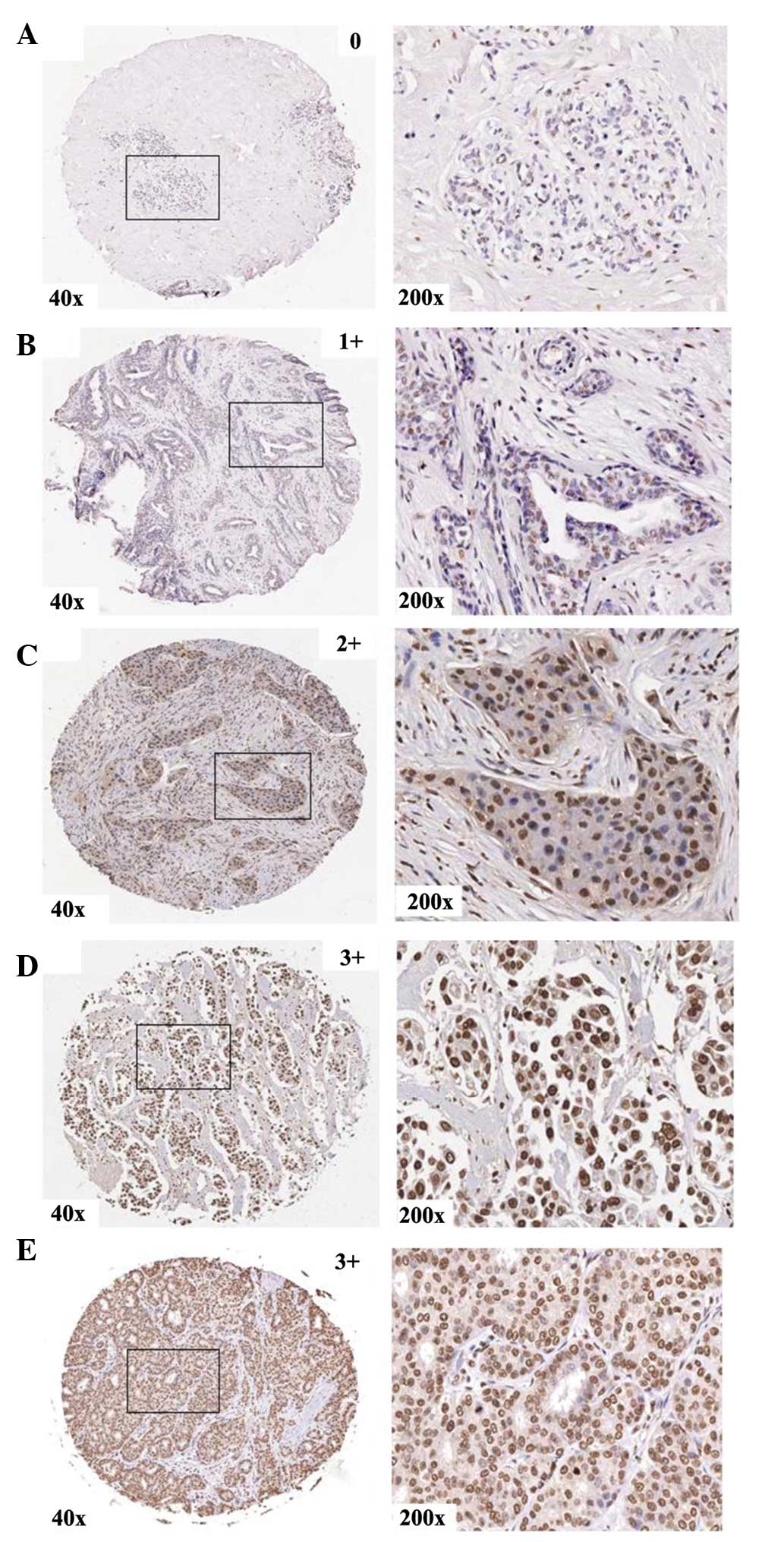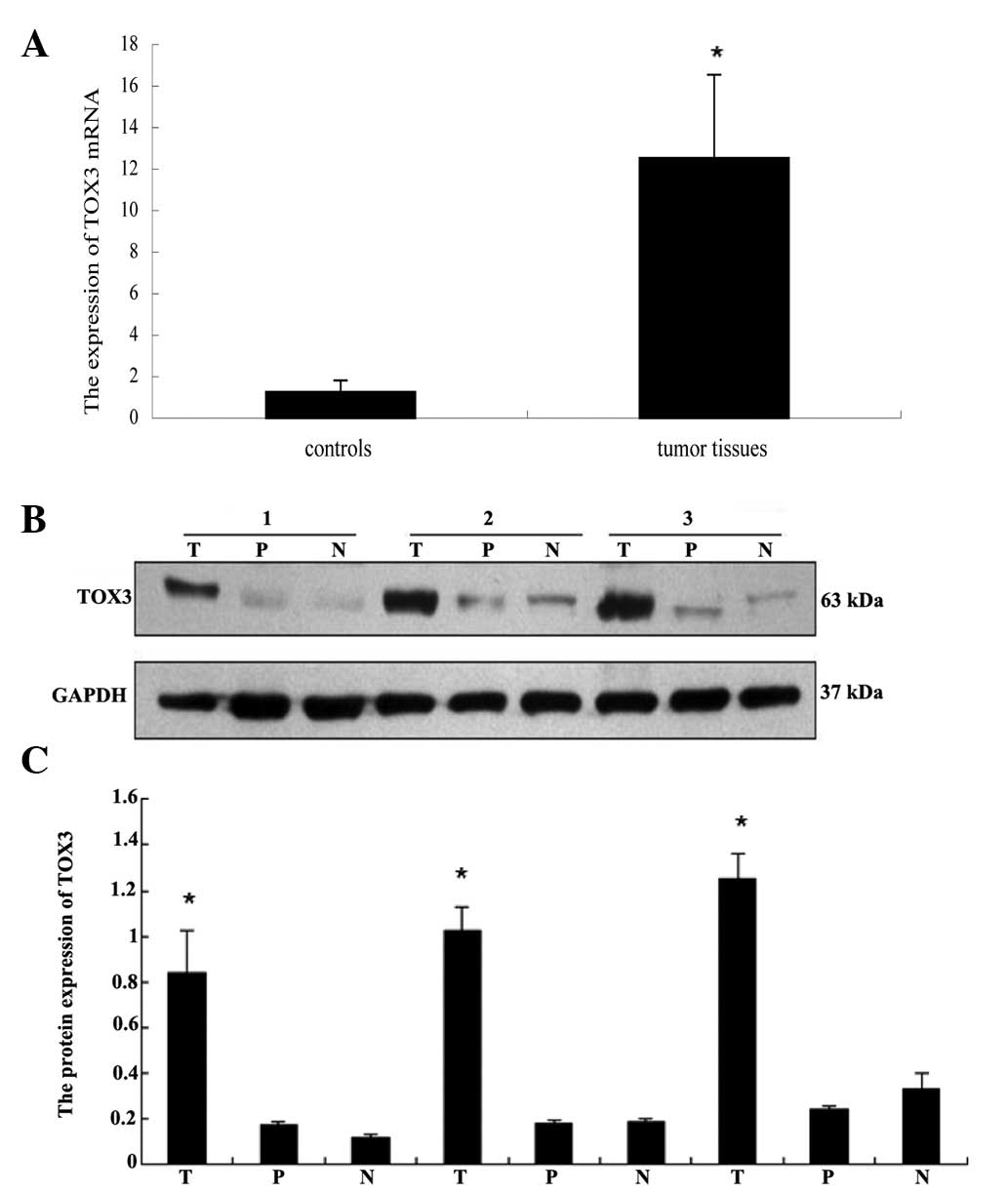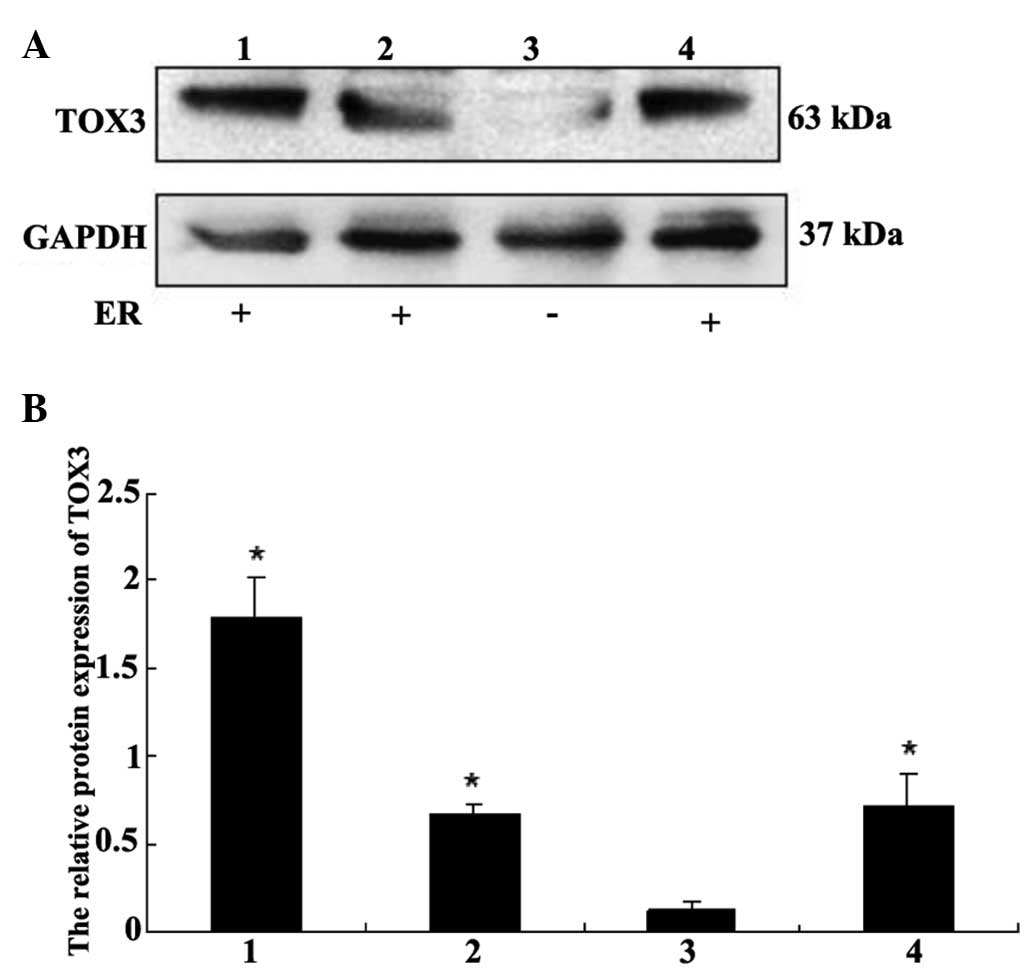|
1
|
Ferlay J, Shin HR, Bray F, Forman D,
Mathers C and Parkin DM: Estimates of worldwide burden of cancer in
2008. GLOBOCAN 2008. Int J Cancer. 127:2893–2917. 2010. View Article : Google Scholar : PubMed/NCBI
|
|
2
|
Dapic V, Carvalho MA and Monteiro AN:
Breast cancer susceptibility and the DNA damage response. Cancer
Control. 12:127–136. 2005.PubMed/NCBI
|
|
3
|
Di LJ, Fernandez AG, De Siervi A, Longo DL
and Gardner K: Transcriptional regulation of BRCA1 expression by a
metabolic switch. Nat Struct Mol Biol. 17:1406–1413. 2010.
View Article : Google Scholar : PubMed/NCBI
|
|
4
|
Prosperi MC, Ingham SL, Howell A, Lalloo
F, Buchan IE and Evans DG: Can multiple SNP testing in BRCA2 and
BRCA1 female carriers be used to improve risk prediction models in
conjunction with clinical assessment? BMC Med Inform Decis Mak.
14:872014. View Article : Google Scholar : PubMed/NCBI
|
|
5
|
Easton DF, Pooley KA, Dunning AM, Pharoah
PD, Thompson D, Ballinger DG, Struewing JP, Morrison J, Field H,
Luben R, et al: Genome-wide association study identifies novel
breast cancer susceptibility loci. Nature. 447:1087–1093. 2007.
View Article : Google Scholar : PubMed/NCBI
|
|
6
|
Stacey SN, Manolescu A, Sulem P, Rafnar T,
Gudmundsson J, Gudjonsson SA, Masson G, Jakobsdottir M, Thorlacius
S, Helgason A, et al: Common variants on chromosomes 2q35 and 16q12
confer susceptibility to estrogen receptor-positive breast cancer.
Nat Genet. 39:865–869. 2007. View
Article : Google Scholar : PubMed/NCBI
|
|
7
|
Ruiz-Narváez EA, Rosenberg L, Cozier YC,
Cupples LA, Adams-Campbell LL and Palmer JR: Polymorphisms in the
TOX3/LOC643714 locus and risk of breast cancer in African-American
women. Cancer Epidemiol Biomarkers Prev. 19:1320–1327. 2010.
View Article : Google Scholar : PubMed/NCBI
|
|
8
|
Liang J, Chen P, Hu Z and Shen H, Wang F,
Chen L, Li M, Tang J, Wang H and Shen H: Genetic variants in
trinucleotide repeat-containing 9 (TNRC9) are associated with risk
of estrogen receptor positive breast cancer in a Chinese
population. Breast Cancer Res Treat. 124:237–241. 2010. View Article : Google Scholar : PubMed/NCBI
|
|
9
|
Chen MB, Wu XY, Shen W, Wei MX, Li C, Cai
B, Tao GQ and Lu PH: Association between polymorphisms of
trinucleotide repeat containing 9 gene and breast cancer risk:
evidence from 62,005 subjects. Breast Cancer Res Treat.
126:177–183. 2011. View Article : Google Scholar : PubMed/NCBI
|
|
10
|
Han W, Woo JH, Yu JH, Lee MJ, Moon HG,
Kang D and Noh DY: Common genetic variants associated with breast
cancer in Korean women and differential susceptibility according to
intrinsic subtype. Cancer Epidemiol Biomarkers Prev. 20:793–798.
2011. View Article : Google Scholar : PubMed/NCBI
|
|
11
|
Elematore I, Gonzalez-Hormazabal P, Reyes
JM, Blanco R, Bravo T, Peralta O, Gomez F, Waugh E, Margarit S,
Ibañez G, et al: Association of genetic variants at TOX3, 2q35 and
8q24 with the risk of familial and early-onset breast cancer in a
South-American population. Mol Biol Rep. 41:3715–3722. 2014.
View Article : Google Scholar : PubMed/NCBI
|
|
12
|
Long J, Cai Q, Shu XO, Qu S, Li C, Zheng
Y, Gu K, Wang W, Xiang YB, Cheng J, et al: Identification of a
functional genetic variant at 16q12.1 for breast cancer risk:
results from the Asia Breast Cancer Consortium. PLoS Genet.
6:e10010022010. View Article : Google Scholar : PubMed/NCBI
|
|
13
|
He X, Yao G, Li F, Li M and Yang X:
Risk-association of five SNPs in TOX3/LOC643714 with breast cancer
in southern China. Int J Mol Sci. 15:2130–2141. 2014. View Article : Google Scholar : PubMed/NCBI
|
|
14
|
Wilkinson B, Chen JY, Han P, Rufner KM,
Goularte OD and Kaye J: TOX an HMG box protein implicated in the
regulation of thymocyte selection. Nat Immunol. 3:272–280. 2002.
View Article : Google Scholar : PubMed/NCBI
|
|
15
|
Birkenkamp-Demtroder K, Mansilla F,
Dyrskjøt L, Thorsen K, Fristrup N, Brems-Eskildsen AS, Munksgaard
PP, Sørensen KD, Borre M and Ørntoft TF: TOX3 (TNRC9) over
expression in bladder cancer cells decreases cellular proliferation
and triggers an interferon-like response. J Mol Biomark Diagn.
4:22013.
|
|
16
|
O'Flaherty E and Kaye J: TOX defines a
conserved subfamily of HMG-box proteins. BMC Genomics. 4:132003.
View Article : Google Scholar : PubMed/NCBI
|
|
17
|
Yuan SH, Qiu Z and Ghosh A: TOX3 regulates
calcium-dependent transcription in neurons. Proc Natl Acad Sci USA.
106:2909–2914. 2009. View Article : Google Scholar : PubMed/NCBI
|
|
18
|
Dittmer S, Kovacs Z, Yuan SH, Siszler G,
Kögl M, Summer H, Geerts A, Golz S, Shioda T and Methner A: TOX3 is
a neuronal survival factor that induces transcription depending on
the presence of CITED1 or phosphorylated CREB in the
transcriptionally active complex. J Cell Sci. 124:252–260. 2011.
View Article : Google Scholar : PubMed/NCBI
|
|
19
|
Xi L, Feber A, Gupta V, Wu M, Bergemann
AD, Landreneau RJ, Litle VR, Pennathur A, Luketich JD and Godfrey
TE: Whole genome exon arrays identify differential expression of
alternatively spliced, cancer-related genes in lung cancer. Nucleic
Acids Res. 36:6535–6547. 2008. View Article : Google Scholar : PubMed/NCBI
|
|
20
|
Tesserma M, Yingling CM, Grimes MJ, Thomas
CL, Liu Y, Leng S, Joste N and Belinsky SA: Differential epigenetic
regulation of TOX subfamily high mobility group box genes in lung
and breast cancers. PLoS One. 7:e348502012. View Article : Google Scholar : PubMed/NCBI
|
|
21
|
Zhang X, Zhu H, Wu X, Wang M, Gu D, Gong
W, Xu Z, Tan Y, Gong Y, Zhou J, et al: A genetic polymorphism in
TOX3 is associated with survival of gastric cancer in a Chinese
population. PLoS One. 8:e721862013. View Article : Google Scholar : PubMed/NCBI
|
|
22
|
Fasching PA, Pharoah PD, Cox A, Nevanlinna
H, Bojesen SE, Karn T, Broeks A, van Leeuwen FE, van't Veer LJ, Udo
R, et al: The role of genetic breast cancer susceptibility variants
as prognostic factors. Hum Mol Genet. 21:3926–3939. 2012.
View Article : Google Scholar : PubMed/NCBI
|
|
23
|
Gudmundsdottir ET, Barkardottir RB, Arason
A, Gunnarsson H, Amundadottir LT, Agnarsson BA, Johannsson OT and
Reynisdottir I: The risk allele of SNP rs3803662 and the mRNA level
of its closest genes TOX3 and LOC643714 predict adverse outcome for
breast cancer patients. BMC Cancer. 12:6212012. View Article : Google Scholar : PubMed/NCBI
|
|
24
|
Riaz M, Berns EM, Sieuwerts AM,
Ruigrok-Ritstier K, de Weerd V, Groenewoud A, Uitterlinden AG, Look
MP, Klijn JG, Sleijfer S, et al: Correlation of breast cancer
susceptibility loci with patient characteristics, metastasis-free
survival, and mRNA expression of the nearest genes. Breast Cancer
Res Treat. 133:843–851. 2012. View Article : Google Scholar : PubMed/NCBI
|
|
25
|
Garcia-Closas M and Chanock S: Genetic
susceptibility loci for breast cancer by estrogen receptor status.
Clin Cancer Res. 14:8000–8009. 2008. View Article : Google Scholar : PubMed/NCBI
|
|
26
|
Reeh M, Bockhorn M, Görgens D, Vieth M,
Hoffmann T, Simon R, Izbicki JR, Sauter G, Schumacher U and Anders
M: Presence of the coxsackievirus and adenovirus receptor (CAR) in
human neoplasms: a multitumour array analysis. Br J Cancer.
109:1848–1858. 2013. View Article : Google Scholar : PubMed/NCBI
|
|
27
|
Lien HC, Lu YS, Cheng AL, Chang WC, Jeng
YM, Kuo YH, Huang CS, Chang KJ and Yao YT: Differential expression
of glucocorticoid receptor in human breast tissues and related
neoplasms. J Pathol. 209:317–327. 2006. View Article : Google Scholar : PubMed/NCBI
|
|
28
|
Arocho A, Chen B, Ladanyi M and Pan Q:
Validation of the 2-DeltaDeltaCt calculation as an alternate method
of data analysis for quantitative PCR of BCR-ABL P210 transcripts.
Diagn Mol Pathol. 15:56–61. 2006. View Article : Google Scholar : PubMed/NCBI
|
|
29
|
Fernandez-Navarro P, Pita G, Santamariña
C, Moreno MP, Vidal C, Miranda-García J, Ascunce N, Casanova F,
Collado-García F, Herráez B, et al: Association analysis between
breast cancer genetic variants and mammographic density in a large
population-based study (Determinants of Density in Mammographies in
Spain) identifies susceptibility loci in TOX3 gene. Eur J Cancer.
49:474–481. 2013. View Article : Google Scholar : PubMed/NCBI
|
|
30
|
Shan J, Dsouza SP, Bakhru S, Al-Azwani EK,
Ascierto ML, Sastry KS, Bedri S, Kizhakayil D, Aigha II, Malek J,
et al: TNRC9 downregulates BRCA1 expression and promotes breast
cancer aggressiveness. Cancer Res. 73:2840–2849. 2013. View Article : Google Scholar : PubMed/NCBI
|
|
31
|
Smid M, Wang Y, Klijn JG, Sieuwerts AM,
Zhang Y, Atkins D, Martens JW and Foekens JA: Genes associated with
breast cancer metastatic to bone. J Clin Oncol. 24:2261–2267. 2006.
View Article : Google Scholar : PubMed/NCBI
|
|
32
|
Nordard SH, Johansen FE, Alnaes GI, Naume
B, Børresen-Dale AL and Kristensen VN: Genes harbouring
susceptibility SNPs are differentially expressed in the breast
cancer subtypes. Breast Cancer Res. 9:1132007. View Article : Google Scholar : PubMed/NCBI
|
|
33
|
O'Brien KM, Cole SR, Engel LS, Bensen JT,
Poole C, Herring AH and Millikan RC: Breast cancer subtypes and
previously established genetic risk factors: a Bayesian approach.
Cancer Epidemiol Biomarkers Prev. 23:84–97. 2014. View Article : Google Scholar : PubMed/NCBI
|

















